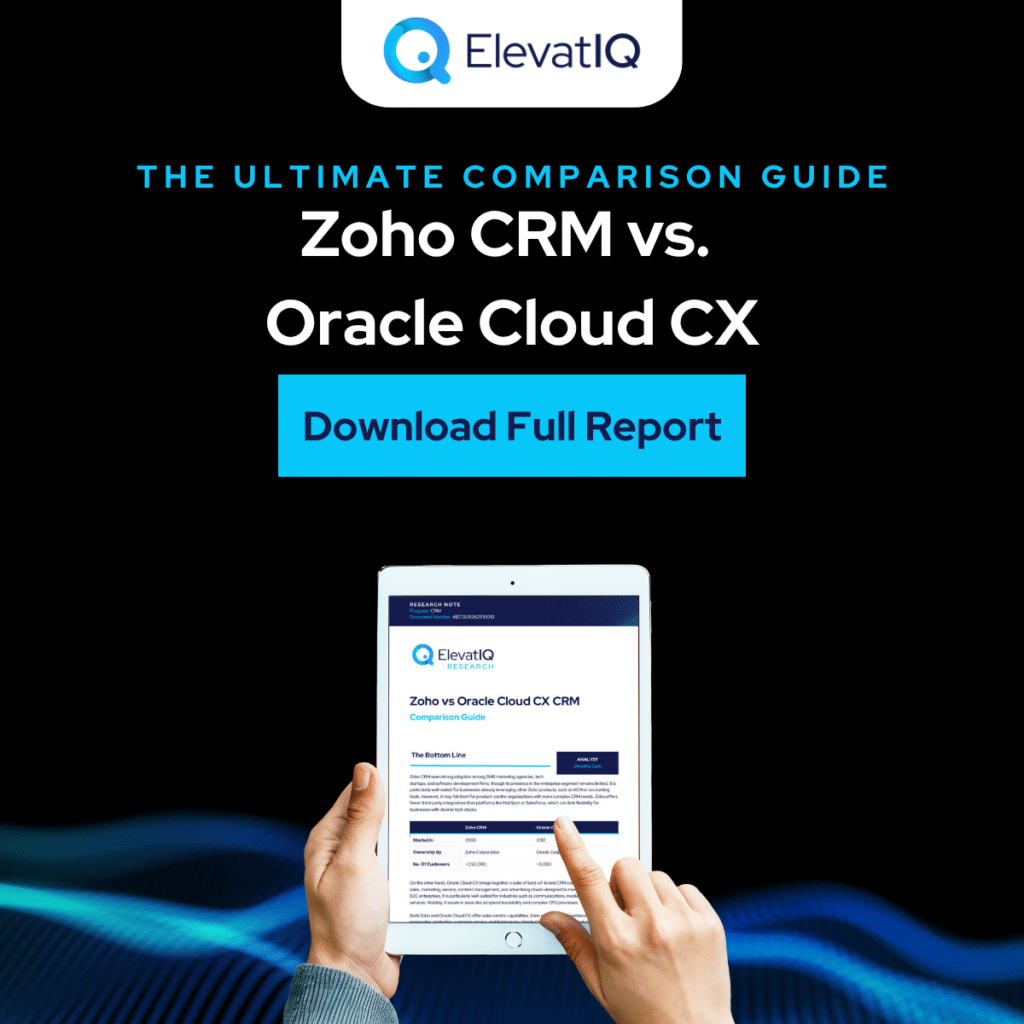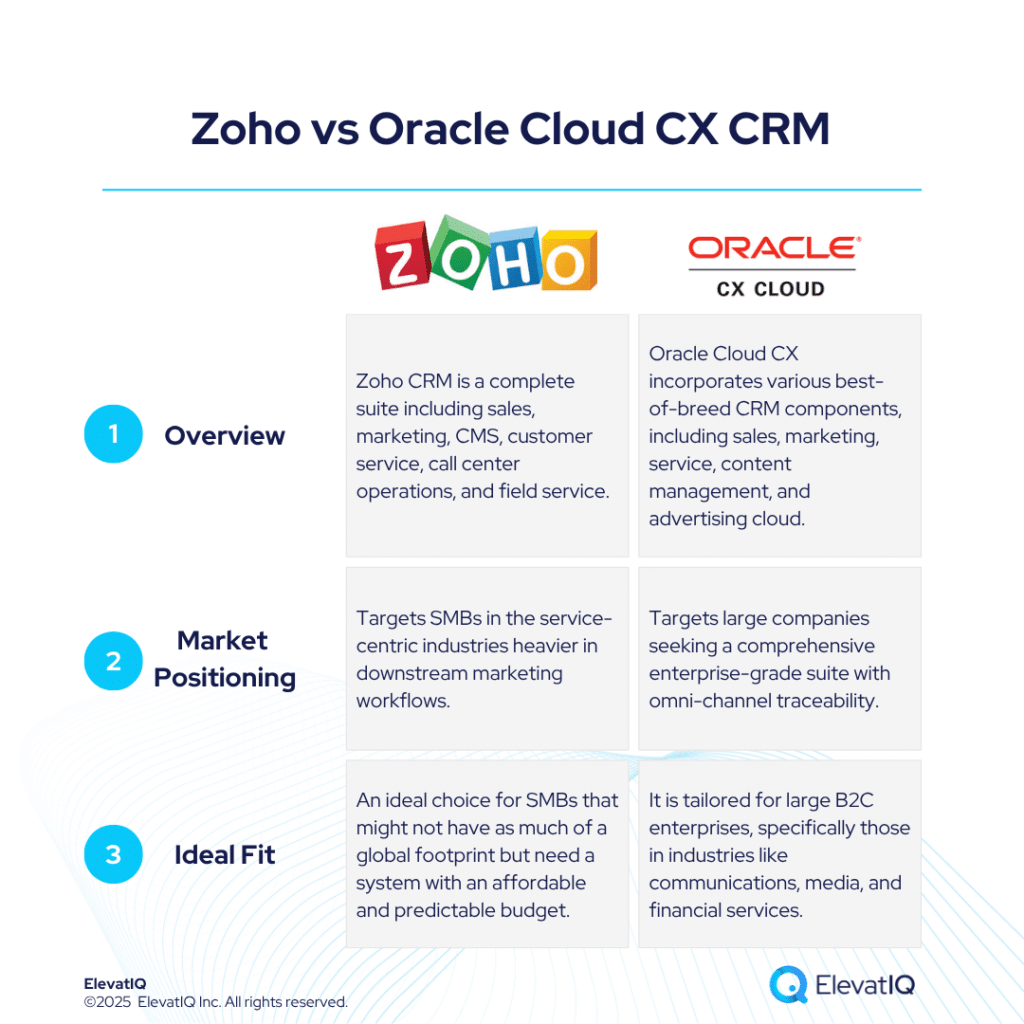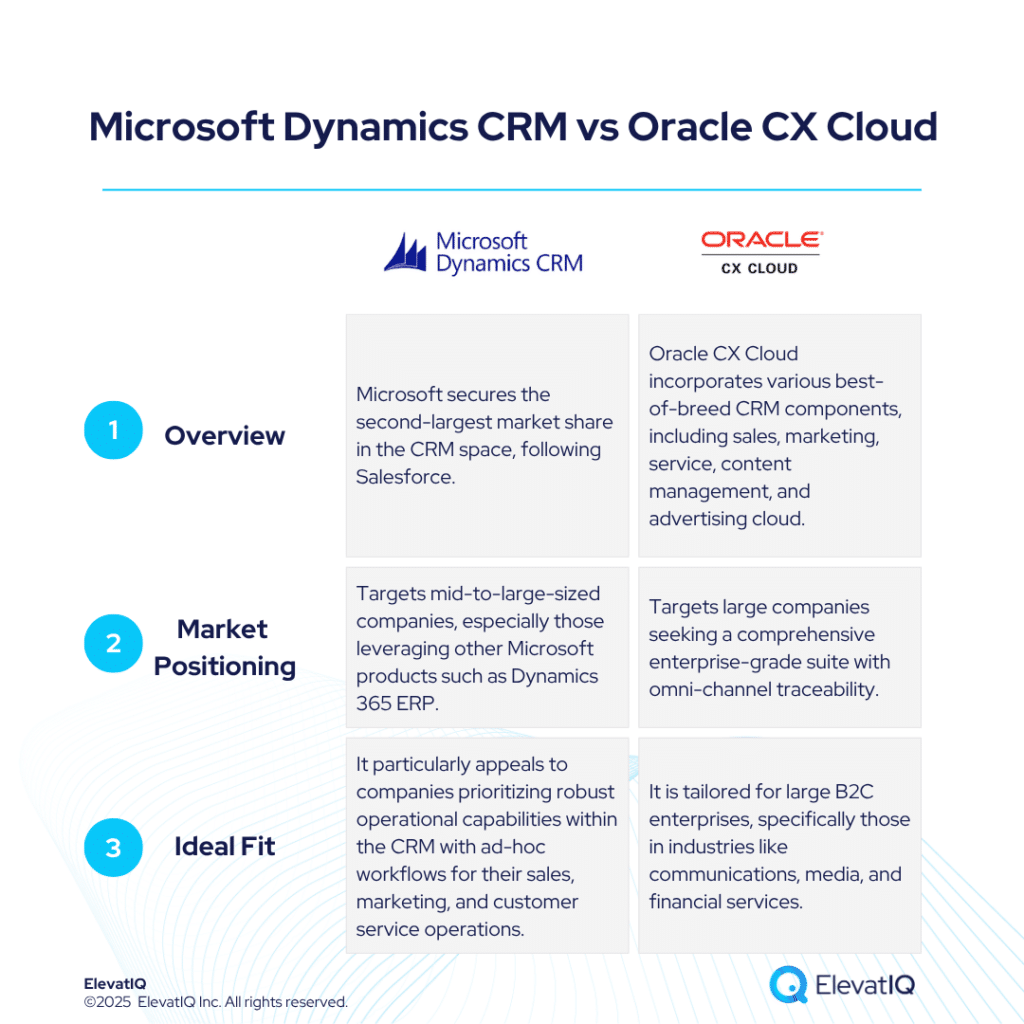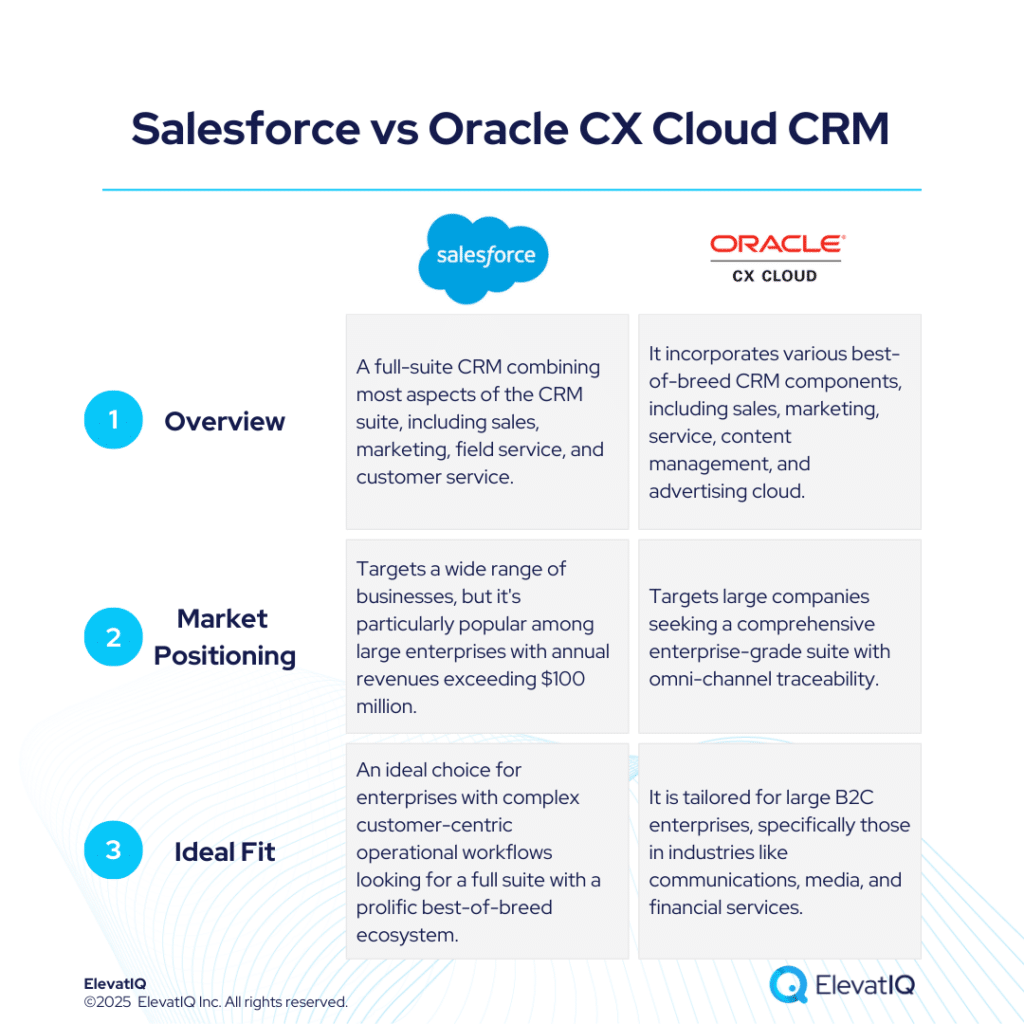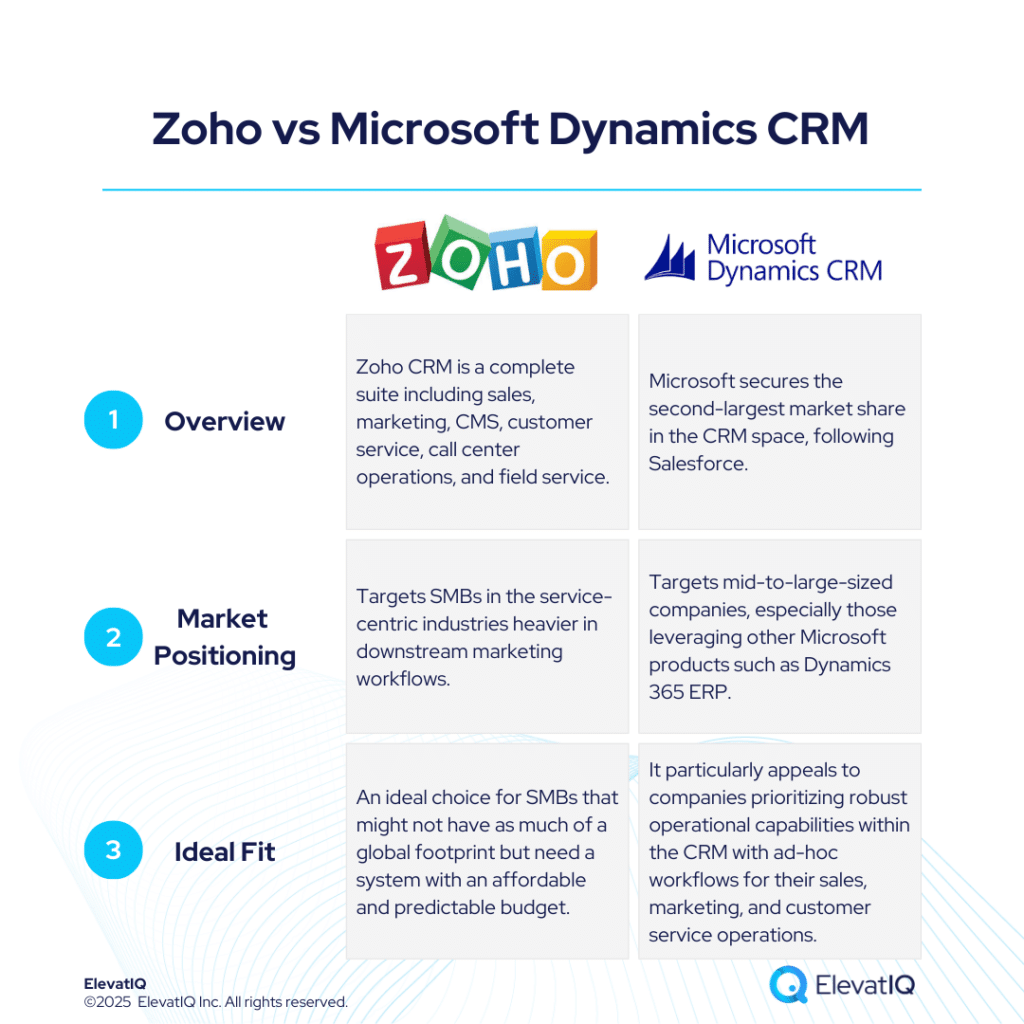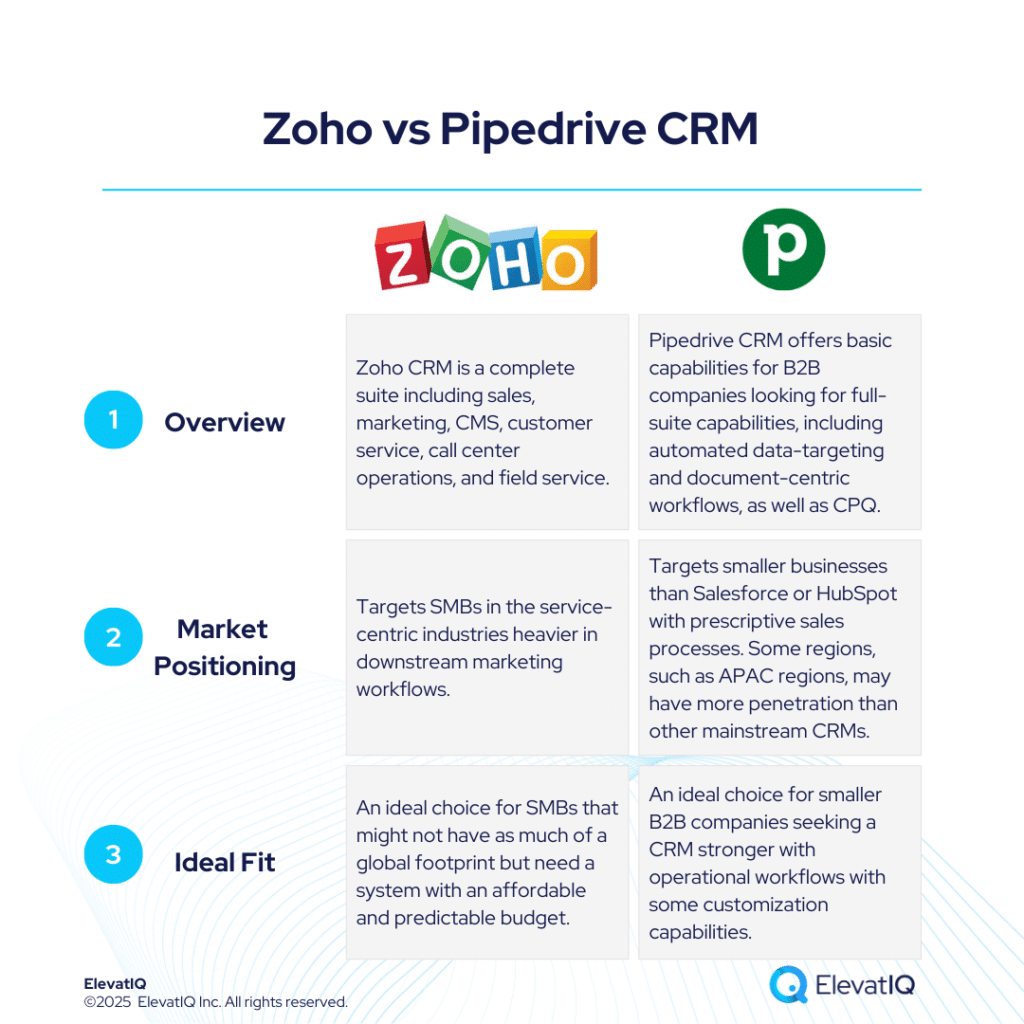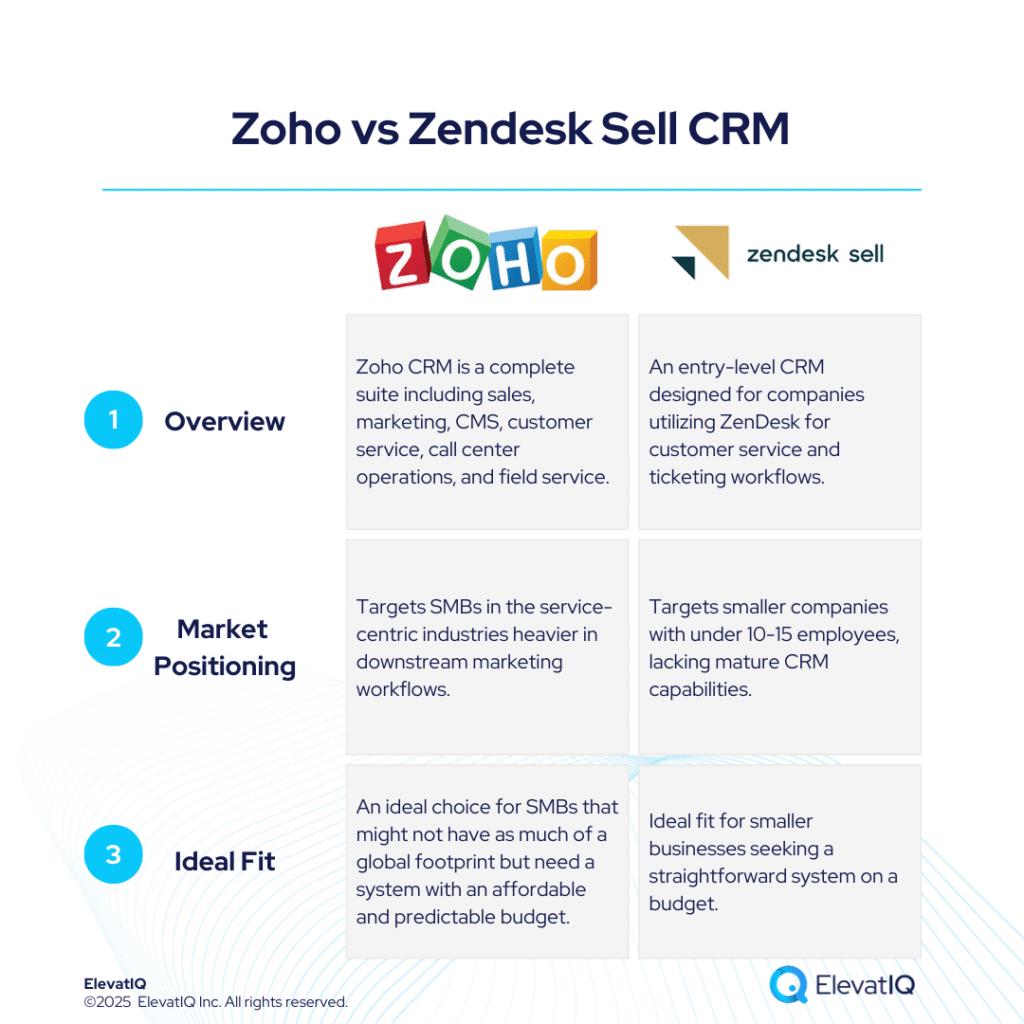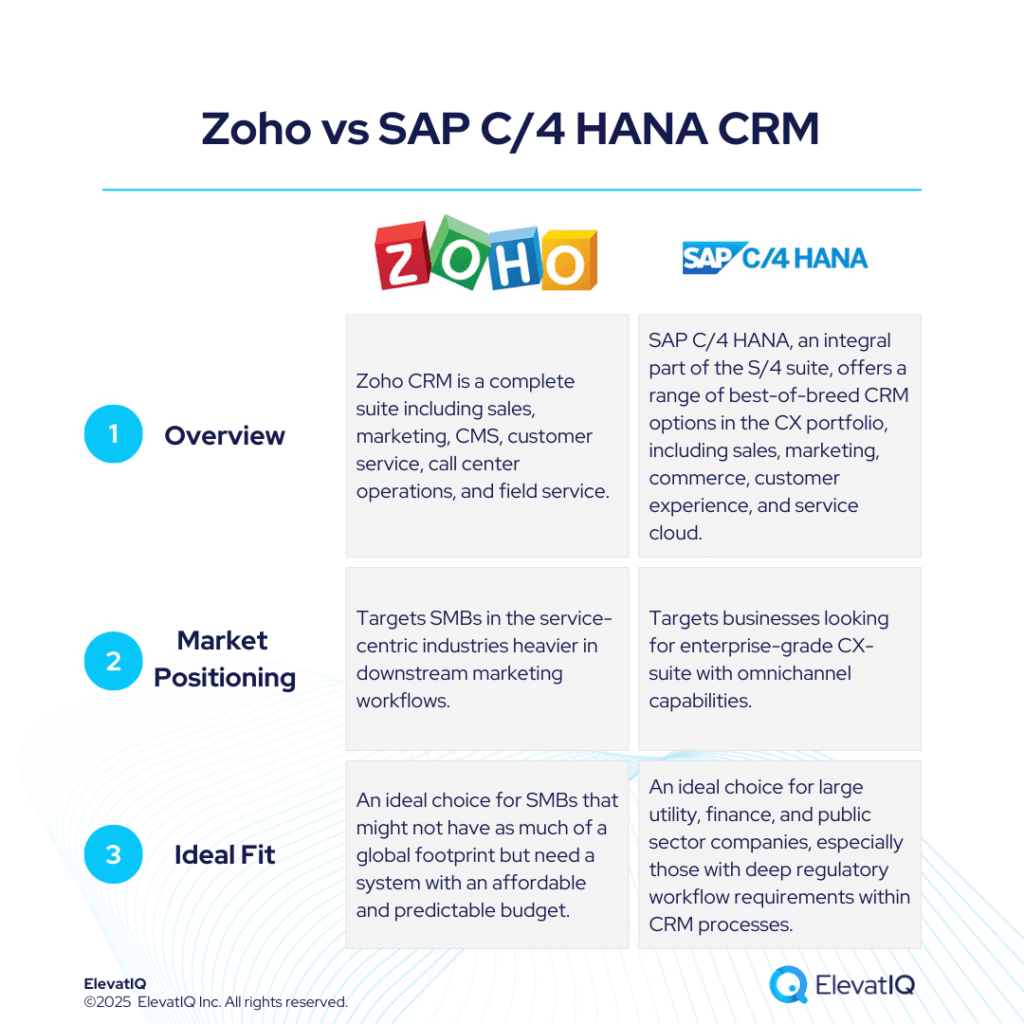Zoho CRM is widely adopted by SMB marketing agencies, tech startups, and software development firms, but its presence in the enterprise sector remains limited. It is particularly beneficial for businesses that already use other Zoho products, such as HCM or accounting tools. Compared to platforms like HubSpot or Salesforce, Zoho offers fewer third-party integrations, which can restrict flexibility for businesses relying on a diverse range of tech tools.
Oracle Cloud CX, by contrast, offers a comprehensive suite of best-in-class CRM modules—including sales, marketing, service, content management, and advertising cloud—tailored for large B2C enterprises. It is particularly strong in verticals such as communications, media, and financial services, and it shines in complex areas like ad spend tracking and CPQ workflows.
Both platforms follow a suite-based approach. Zoho offers an all-in-one solution covering sales, marketing, customer service, and field operations. Oracle Cloud CX, meanwhile, delivers enterprise-grade functionality with strengths in marketing automation, ad spend traceability, and digital asset management.
While Zoho provides a workflow-focused suite suitable for growing businesses, Oracle Cloud CX distinguishes itself with advanced support for regulated processes and robust CPQ capabilities—making it a better fit for highly specialized industries like media, telecom, and financial services. Though Zoho includes CPQ features in its bundled package, replicating the depth and seamless integration of Oracle’s offerings typically demands extensive customization and consulting, which may be impractical for SMBs.
Regarding integration and ecosystem support, Zoho operates within a relatively closed system, offering limited third-party app compatibility. Oracle Cloud CX is even more restricted in this respect, as it lacks widespread recognition as a mainstream CRM platform, resulting in a narrower ecosystem overall.
What Is Zoho CRM?
Zoho has steadily grown its CRM portfolio to address a diverse range of business needs, from small startups to enterprise-level organizations. Its Bigin product is purpose-built for small businesses with limited budgets, offering essential CRM features in a DIY-friendly package that requires little to no consulting support. Meanwhile, Zoho CRM—the company’s flagship offering—has evolved from an SMB-focused platform into a more robust solution capable of supporting mid-market and even some enterprise-level organizations. Zoho’s approach mirrors that of Microsoft, emphasizing breadth across its application suite to cover everything from sales and marketing to ITSM and business intelligence. Its extensive lineup of native applications helps businesses minimize reliance on third-party vendors, although this strategy comes at the cost of a more limited ecosystem and fewer native integrations.
Despite Zoho’s advancements, critical questions remain for growing businesses evaluating CRM platforms. How important is ecosystem openness and the availability of third-party integrations to your long-term strategy? Can your organization thrive within a closed-loop environment that prioritizes native tools over best-of-breed flexibility? And will the lower upfront cost of Zoho truly offset potential expenses related to integration or scaling over time? If you’re trying to determine whether Zoho or Oracle Cloud CX is the better fit for your organization’s needs, download our Ultimate Zoho CRM vs. Oracle Cloud CX Comparison Guide now.
What Is Oracle Cloud CX?
Oracle Cloud CX presents a powerful option for enterprises already invested in Oracle’s broader cloud ecosystem, particularly those with complex regulatory requirements and global CRM needs. Its deep integration with Oracle Cloud ERP, advanced CPQ, and ad management tools make it a strong fit for large, service-oriented industries. Unlike Zoho’s unified and internally developed marketing automation suite, Oracle offers two separate enterprise-grade solutions for B2B and B2C—enabling more specialization, but often adding complexity. Zoho’s streamlined automation and native toolset offer a faster, lower-friction setup for workflow automation, making it more approachable for SMBs or mid-market organizations that want functionality without the overhead of heavy consulting.
Yet the trade-offs between flexibility, complexity, and cost raise important strategic questions for buyers. How much customization do you truly need—and at what cost? Can your team manage a more rigid platform like Oracle Cloud CX, or would Zoho’s integrated, mobile-friendly, and AI-embedded approach better serve your business goals? Are you prepared to navigate Oracle’s extensive setup requirements, or do you need something that can deliver value more quickly with fewer external resources? To get a comprehensive view of how these platforms compare across key areas like scalability, automation, integration, and total cost of ownership, download the Ultimate Zoho CRM vs. Oracle Cloud CX Comparison Guide now.
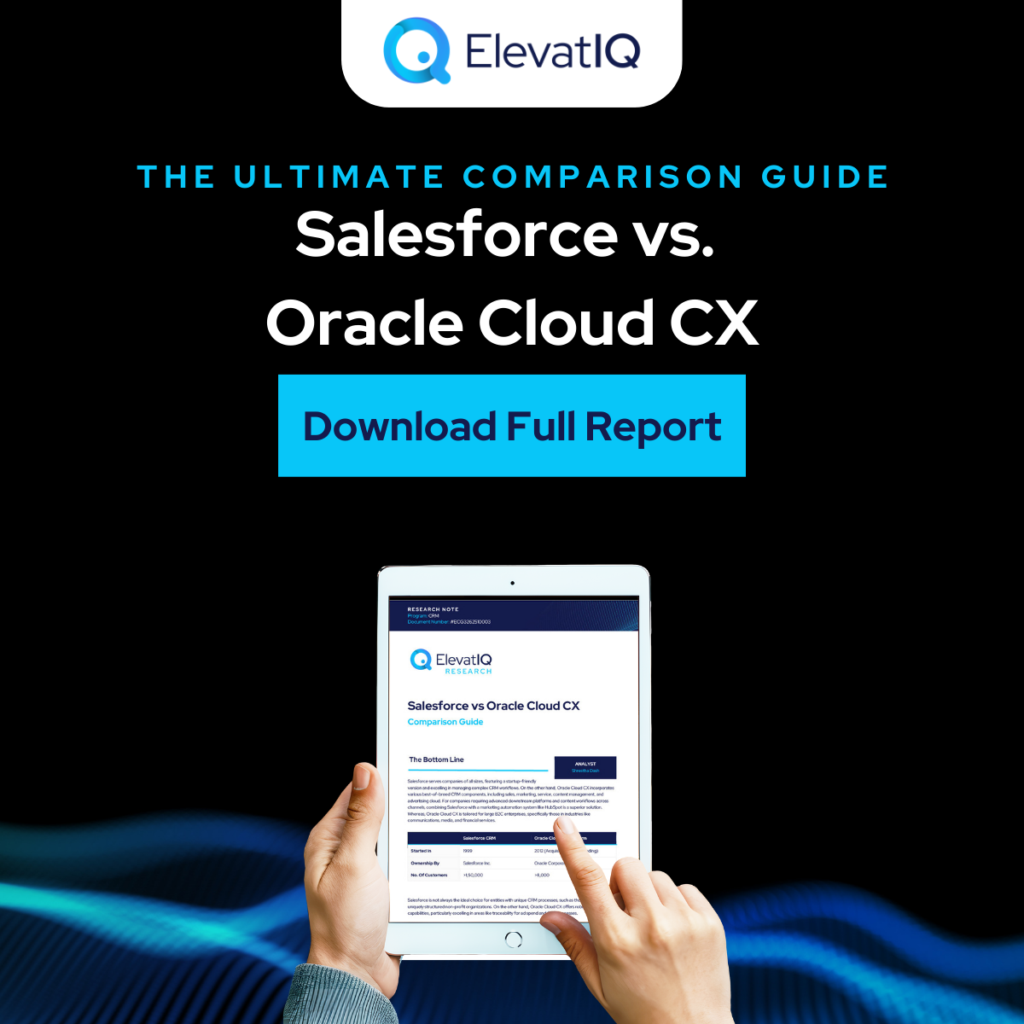
Zoho CRM vs Oracle Cloud CX Comparison
While Zoho CRM mirrors Salesforce’s data model and offers some integration across its native apps, it may lack the extensibility and regulatory robustness required by larger enterprises. Oracle Cloud CX, in contrast, delivers a highly customizable and enterprise-ready architecture that supports complex sales automation, service management, and advanced territory planning—but at a much higher cost and often with the need for significant consulting support. Zoho stands out for its simplified pricing model and ease of use, particularly for SMBs looking to consolidate business functions under a unified platform without incurring high integration or consulting costs.
However, determining the right fit requires answering a few critical questions. Are you prioritizing enterprise-grade functionality with deep customization, or are you looking for a nimble, cost-effective solution that’s easy to deploy and manage? Does your organization require tight integration with a broader ERP ecosystem like Oracle’s, or would native app synergy within Zoho’s suite offer greater efficiency? Can your team handle the complexity of Oracle’s feature set, or would Zoho’s simplified, workflow-centric environment better align with your operational model? For a detailed breakdown across all key dimensions—from data models and automation to pricing and ecosystem strength—download the Ultimate Zoho CRM vs. Oracle Cloud CX Comparison Guide now.
Zoho CRM vs Oracle Cloud CX Module Comparison
Both platforms come equipped with a wide array of features aimed at optimizing business operations and driving efficiency. In this feature comparison, we explore the unique strengths of Zoho CRM and Oracle Cloud CX across several key areas, offering valuable insights to help businesses make a well-informed CRM choice. Specifically, this section examines the capabilities of each platform within the core modules of marketing, sales, customer service, and e-commerce.
Marketing
When it comes to content and campaign management, Zoho CRM and Oracle Cloud CX take distinctly different approaches tailored to their target markets. Zoho CRM leverages its broader ecosystem—tools like Zoho Writer, PageSense, Sites, and Campaigns—to support content creation, SEO, social media, and email marketing, all under a single, cost-effective umbrella. Its social media capabilities, powered by Zoho Social, enable users to manage and analyze engagement across major platforms. While it lacks a centralized, dedicated content creation module like HubSpot, Zoho’s modular approach offers a cohesive experience for SMBs looking to streamline digital marketing within one ecosystem.
Oracle Cloud CX, on the other hand, delivers enterprise-grade content management and campaign automation through its Marketing Cloud. With powerful tools for segmentation, personalization, and integration across various marketing channels, Oracle is built for businesses requiring high-volume, data-driven campaigns. It also benefits from partner integrations to enhance SEO and social media management. But with all that power comes added complexity and cost. So, what’s more important for your team—an affordable, all-in-one suite with strong native functionality, or a scalable enterprise solution with deeper capabilities but heavier overhead? Can your marketing team make full use of Oracle’s advanced features, or would Zoho’s intuitive tools drive faster results? Download the Ultimate Zoho CRM vs. Oracle Cloud CX Comparison Guide now to uncover which platform aligns best with your business goals.
Sales
Zoho CRM and Oracle Cloud CX both offer robust sales and collaboration features, but they differ significantly in usability and integration depth. Zoho CRM excels in lead management and sales pipeline tracking, providing intuitive tools to capture, nurture, and convert leads while offering a clear visual overview of deal progression. It also includes built-in email tracking, pre-designed templates, and seamless meeting scheduling with integrated calendars and reminders—features especially valuable for SMBs and mid-sized teams. Additionally, Zoho’s real-time chat and collaboration tools enable sales teams to stay connected and agile within the same platform.
Oracle Cloud CX, while more complex, is tailored for enterprise-level lead management and sales operations with broader end-to-end capabilities. It integrates tightly with Oracle Marketing Cloud for email tracking and offers flexible task management tools that support meeting coordination, albeit without dedicated scheduling features. Team collaboration is supported through various enterprise tools, but may require additional configuration or integrations to match Zoho’s out-of-the-box simplicity. So, which platform aligns better with your team’s sales process and collaboration needs? Do you prioritize an all-in-one, user-friendly experience or enterprise-grade depth with scalable integrations? Download the Ultimate Zoho CRM vs. Oracle Cloud CX Comparison Guide now.
Customer Service
Both Zoho CRM and Oracle Cloud CX deliver comprehensive customer service capabilities, but they differ in their approach to usability and scale. Zoho CRM, supported by Zoho Desk and Zoho SalesIQ, offers a tightly integrated ticketing system, live chat, and customer support automation features like predefined responses, escalation rules, and workflow automation. These tools make it easy for SMBs to manage service requests efficiently without relying on complex setups. Its omni-channel support also ensures consistent customer engagement across email, chat, phone, and social media—all from a unified platform.
Oracle Cloud CX, particularly through its Oracle Service Cloud, is engineered for large-scale customer service environments that demand more advanced automation and AI capabilities. It includes robust ticketing, AI-driven recommendations, and full omni-channel engagement, designed to support global service teams and complex enterprise needs. However, its implementation can require significant technical expertise and integration effort. So, what matters more to your organization—quick deployment with built-in automation or enterprise-scale service tools with deeper configurability? Is your team equipped to manage Oracle’s complexity, or would Zoho’s simplicity and native integration better suit your support model? Download the Ultimate Zoho CRM vs. Oracle Cloud CX Comparison Guide now to discover which solution is the right fit for your customer service strategy.
E-commerce
When it comes to supporting e-commerce and product-driven workflows, both Zoho CRM and Oracle Cloud CX offer tools designed to streamline catalog and order management—but with different levels of scale and complexity. Zoho CRM, in combination with Zoho Inventory, enables businesses to manage product catalogs, track inventory, and oversee order fulfillment in an integrated environment. This setup is especially appealing for SMBs looking for a cohesive platform to deliver personalized shopping experiences through unified data and lightweight integrations across the Zoho ecosystem.
Oracle Cloud CX, on the other hand, is built to handle enterprise-level e-commerce operations with powerful catalog management and seamless integration with Oracle Order Management Cloud. It offers personalized shopping journeys, leveraging AI and customer insights to deliver tailored content and product recommendations—ideal for large-scale, multi-channel retailers. But does your business need enterprise-grade complexity, or will Zoho’s streamlined tools meet your product and fulfillment requirements? Are you prioritizing scalability or ease of deployment and integration? Download the Ultimate Zoho CRM vs. Oracle Cloud CX Comparison Guide now to uncover which platform best aligns with your e-commerce strategy.
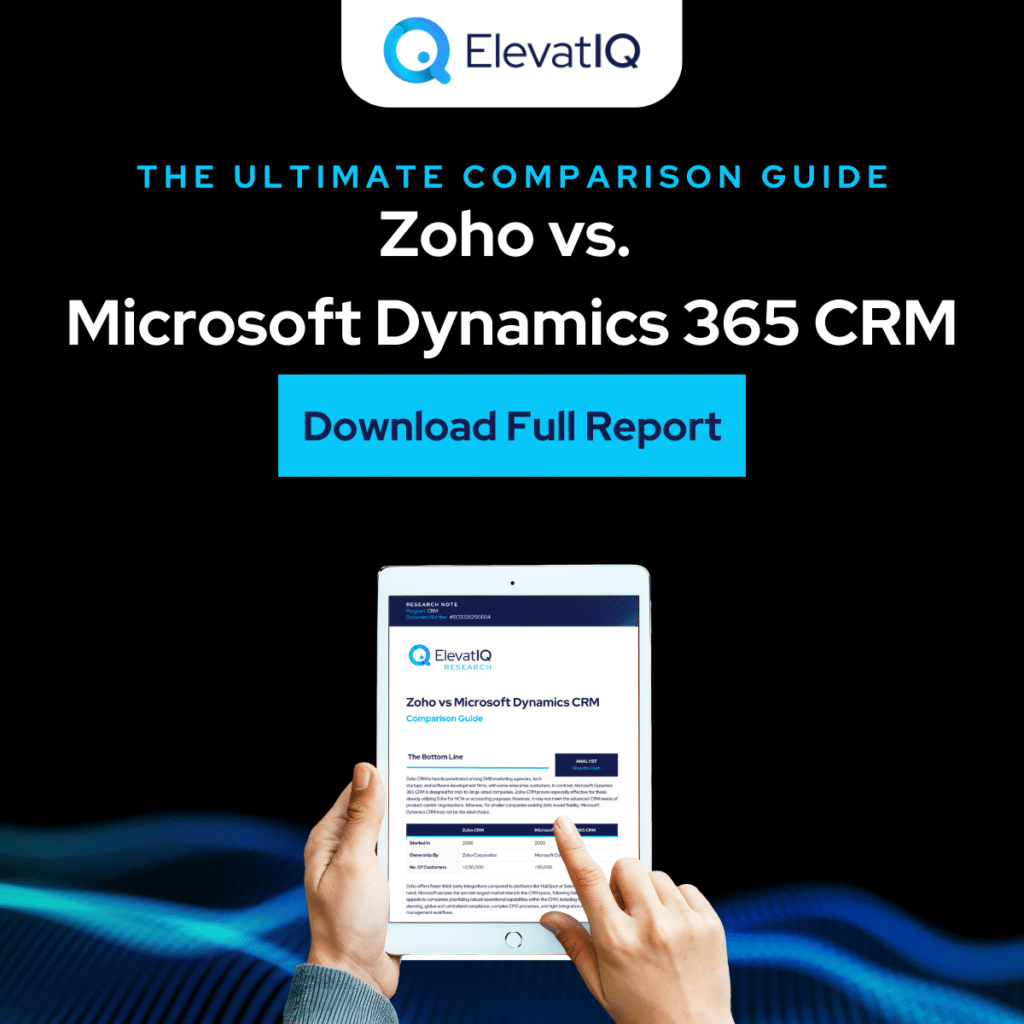
Zoho CRM vs Oracle Cloud CX Pros
Zoho CRM and Oracle Cloud CX both cater to advanced business needs, but they differ in how they approach customization, integration, and industry alignment. For example, Zoho CRM stands out with its built-in workflow builder and the inclusion of Zoho Creator, allowing developers to build intricate workflows and custom applications without relying on third-party tools. This is ideal for businesses that want flexibility without heavy IT overhead. Zoho also excels in embedding field service workflows within its CRM and supports marketing automation, although at a lighter enterprise scale.
Oracle Cloud CX, in contrast, offers a more comprehensive enterprise-grade stack, particularly in CPQ and ad-spend tracking—features that make it especially appealing to telecom and media companies. With powerful tools for territory planning, sales compensation, and behavioral insights, Oracle delivers deep functionality tailored for complex, high-volume operations. But is that level of complexity necessary for your business? Or would a more agile, developer-friendly platform like Zoho CRM provide a faster path to value? Download the Ultimate Zoho CRM vs. Oracle Cloud CX Comparison Guide now to evaluate which platform is better aligned with your operational needs and strategic goals.
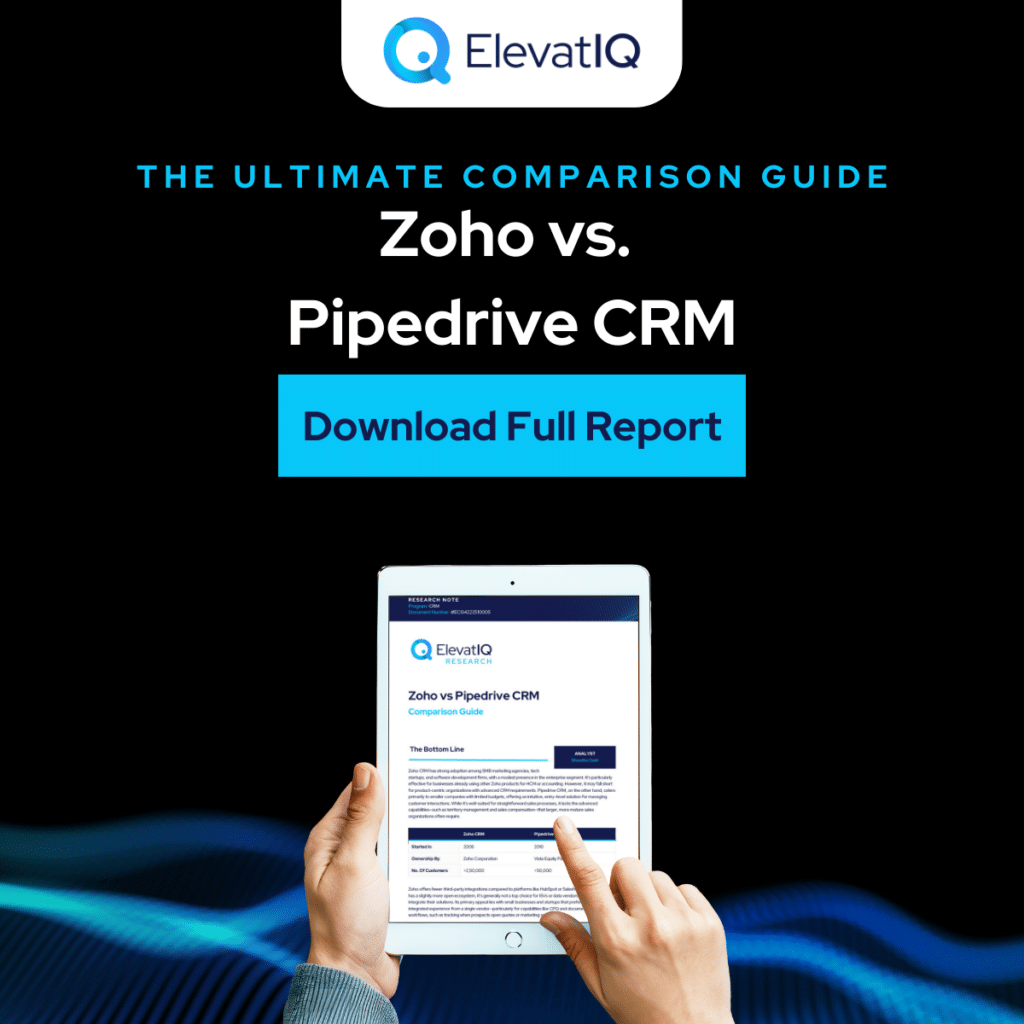
Zoho CRM vs Oracle CX Cloud Cons
Zoho CRM offers a user-friendly platform that serves many SMBs well, but it has notable limitations in territory management and sales team planning. Integration beyond the Zoho ecosystem can be challenging, restricting flexibility for companies that rely on diverse third-party tools. While Zoho’s platform is robust, its relative complexity means organizations must invest in change management to fully realize its benefits. Compared to competitors like HubSpot, Zoho operates within a somewhat closed ecosystem, which can limit scalability and customization in certain scenarios.
Oracle Cloud CX brings a broad suite of integrated systems aimed at enhancing customer experience, but this comes with trade-offs such as a clunky user interface and a steep learning curve. Its complex data and process models often necessitate consulting support, making it a significant investment in both time and resources. Additionally, Oracle’s post-sales CRM capabilities, especially in B2B contexts, may not fully meet all business needs. So, does your organization have the capacity and budget to manage Oracle’s complexity? Or would Zoho’s simpler yet more limited platform better suit your sales and integration requirements? Download the Ultimate Zoho CRM vs. Oracle Cloud CX Comparison Guide now.
Download the Full Research Report
